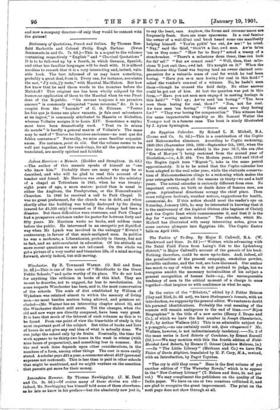Winchester. By R. Townsend Warner. (G. Bell and Sons. 2s.
61)—This is one of the series of "Handbooks to the Great Public Schools," and quite worthy of its place. We do not look for anything like criticism in books of this kind. They are meant to describe, not to suggest, far less to revolutionise. In some respects Winchester has been, and is. the most conservative of the schools. The scale of diet established by William of Wykeham was retained almost to within the memory of living men—no meat besides mutton being allowed, and potatoes ex- cluded—(Mr. Warner has an interesting chapter about it), and the Winchester dialect still exists. Yet the changes, when the old and new ways are directly compared, have been very great. It is here that much of the interest of such volumes as this is to be found. From one point of view the time-table of study is the most important part of the subject. But titles of books and lists of hours do not give any real idea of what is actually done. We can judge the school only by its fruits. Nominally, the time for work appears to be thirty-two hours in the week in winter (with nine hours of preparation), and something less in summer. But the real work done depends upon other considerations, in the numbers of a form, among other things The cost is more easily stated. A scholar pays £21 a year. a commoner about .2127 (personal expenses not reckoned). This is less than is paid in other schools that might be mentioned, and we might venture on the assertion that parents get more for their money.






































 Previous page
Previous page